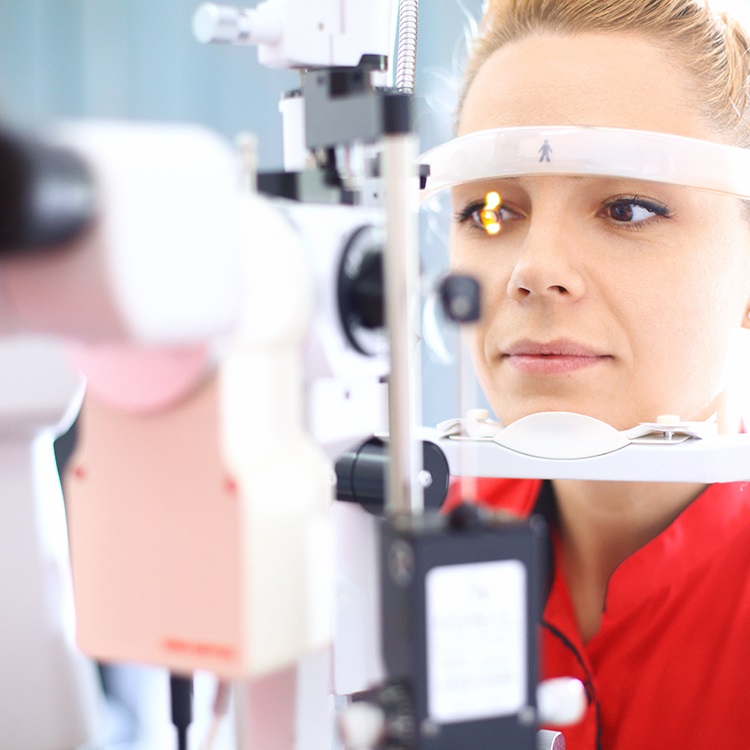What is thyroid eye disease?
Thyroid eye disease is an immune-mediated disorder characterized by swelling, bulging, blurred vision and doubled vision. It results from the body’s own immune cells mistakenly recognizing its own ocular tissues as “foreign”. The responding immune cells initiate a cascade of inflammatory chemicals that produce the characteristic deformities of thyroid eye disease. The association of these ocular deformities with clinical hyperthyroidism and dermatopathy was first described by Dr. Graves and has come to be known as Graves’ Disease. It affects about 1 in 200 people and nearly half of those will develop thyroid eye disease.3-4
What are the signs and symptoms of thyroid eye disease?
Symptoms for thyroid eye disease typically develop within six months of diagnosis of Graves’ disease and may include: 1,2
- Dry eyes
- Irritation or grittiness in the eyes
- Redness or inflammation
- Excessive tearing
- Pressure or pain in the eyes
- Light sensitivity
- Difficulty closing the eyes
- Bulging eyes
- Double vision
- Vision loss
What are the risk factors for thyroid eye disease?
- Family history- A family history of thyroid disease.
- Gender- Women are more likely to develop Graves’ disease than men.1-2
- Age- Usually affects middle age adults but can occur at any age.
- Other autoimmune disorders- Individuals with disorders of the immune system, such as type 1 diabetes or celiac disease, have an increased risk of thyroid eye disease.
- Individuals treated with radioactive iodine or anti-thyroid medications.
- Individuals with radiation treatment to the neck or upper chest.
- Prior thyroid surgery (partial thyroidectomy).
- Stress- In people who have genes that increase their risk, stress can act as a trigger for the onset of Graves’ disease.
- Pregnancy or recent childbirth can increase the risk of thyroid eye disease, particularly for women who have genes that increase their risk.
- Smoking- Smoking can affect the immune system and increases the risk of Graves’ disease. Smokers who have Graves’ disease are also at increased risk of developing Graves’ ophthalmopathy.2
Examination
If you have thyroid disease and have experienced any of the symptoms listed above or suspect that you have thyroid eye disease, contact your primary doctor. Your doctor may recommend that you see an eye doctor.
Ophthalmologists with special interest and training in thyroid eye disease will be able to evaluate your symptoms and recommend a course of treatment.
Treatments for Thyroid Eye Disease
If you have been diagnosed with thyroid eye disease, one or more of the following treatments may help soothe your eyes and improve your vision. It is essential to discuss any course of treatment or surgical options with your eye doctor first.
- Apply cool compresses to your eyes- for relief from pressure or swelling.
- Wear sunglasses- to reduce sensitivity to light and wind while protecting the eyes from ultraviolet rays.
- Use lubricating eye drops- for relief from dryness and irritation.
- Elevating your head while in bed – can help to reduce swelling and relieve pressure.
- Selenium supplements- Recent studies suggests that patients with mild active thyroid eye disease may benefit from selenium supplements.3
- Steroids- your doctor may recommend steroids to help reduce swelling in the eyes.
- Eyelid surgery- surgical repositioning of the eyelid may help reduce the irritation.
- Eye Muscle Surgery- your ophthalmologist may recommend eye muscle surgery to help correct double vision.
- Orbital Decompression Surgery- if eyesight is threatened, your ophthalmologist may recommend a type of surgery called orbital decompression.1
- New treatments- Tepezza, an insulin-like growth factor receptor antagonist is now FDA approved for the treatment of moderate to severe thyroid eye disease.3
Always speak with your eye care professional before considering any treatment options. It is also essential to schedule regular eye exams for early detection.

